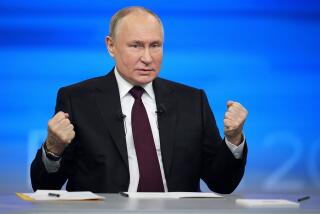In the Words of Gorbachev . . .
- Share via
Since setting the Soviet Union on its course of radical political, economic and social change in 1985, President Mikhail S. Gorbachev has spoken, frequently and forcefully, of his vision of a democratic and prosperous country at peace with itself and the world.
Some examples:
“The world today is one in which a struggle is under way between reason and madness, morality and savagery, life and death. We have determined our place in this struggle, definitely and irreversibly. We are on the side of reason, morality and life. That is why we are for disarmament, most notably nuclear disarmament, and for creating a system of general security. This is the only possible way that mankind can regain immortality.”
--In an interview with Indian journalists in November, 1986
“We need democracy like air. If we do not realize this, and even if we do realize it but do not take real steps in expanding and advancing it--and involving the workers of the country in the process of perestroika (restructuring)--our policy will choke and will suffocate. Perestroika is not a stroll down a road that has been rolled smooth.”
--Central Committee meeting, January, 1987
“We would be making a great political blunder were we not to pay attention to the very profound changes in the mood of the world public, among the people of the world. People are weary of war . . . of tension and conflict . . . of being swamped by information that spoils their day today and promises even worse for tomorrow. And people have started to feel their will. Their word, their wishes, their desires, their interests are not always reflected in real politics, and they have begun to do something about it.”
--At a press conference during President Ronald Reagan’s visit to Moscow, June, 1988
“What the 21st Century will be like depends on whether we learn the lessons of the 20th Century and avoid repeating its worst mistakes. In my view, one of the principal lessons is that the end, no matter how noble and attractive it may seem, never justifies indiscriminate means. On the contrary, the means that we can choose, in the final analysis, either help us to reach our goal or distort that goal--or lead us in the wrong direction altogether. . . .”
--Interview with Time magazine before his visit to Washington in May, 1990
Key Successes
When President Gorbachev first outlined his approach to foreign policy, which he called “new political thinking,” Western skeptics dismissed it as propaganda. But Soviet diplomatic successes gathered momentum as the Kremlin proved its sincerity. DISARMAMENT--Soviet concessions cleared the way for the 1987 Soviet-U.S. treaty that eliminates land-based, mid-range nuclear missiles. A treaty reducing conventional armed forces in Europe should be ready for signatures next month. SUPERPOWER RELATIONS--In eight Soviet-U.S. summit meetings, Gorbachev has worked to turn the superpower relationship from one of hostility into a partnership promoting peace. EASTERN EUROPE--Gorbachev said that every nation has the right to self-determination and encouraged the region’s democratization. GERMAN REUNIFICATION--In recognizing Germans’ right to national unity, Gorbachev became the key figure, next to Chancellor Helmut Kohl, in the unification of Germany. MIDDLE EAST--Soviet-Israeli relations are now near normalization, and ties with Saudi Arabia have been fully restored. Moscow is now working with Washington in the Persian Gulf crisis to force Iraq, an old ally, to withdraw from Kuwait.
More to Read
Sign up for Essential California
The most important California stories and recommendations in your inbox every morning.
You may occasionally receive promotional content from the Los Angeles Times.










